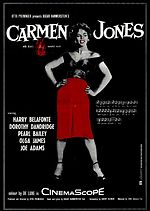Dorothy Dandridge
Dorothy Dandridge (Cleveland, Ohio, November 9, 1922-Hollywood, California, September 8, 1965) was an American singer and actress, the second African-American to be nominated for an Oscar (in 1954, for her role in the film Carmen Jones, by Otto Preminger). Despite her occasional successes, racism prevailed at that time, and Dorothy Dandridge died prematurely, after several professional and personal setbacks. Later stars have praised her as a trailblazer for her, including Halle Berry, who played her in a biopic.
Biography
Dorothy Dandridge was born in Cleveland, Ohio, the daughter of a cabinetmaker, Cyril Dandridge, and an aspiring artist, Ruby Dandridge. The marriage had two girls (Vivian and Dorothy) and they separated soon, and both were left in the care of her mother, who introduced them to show business at a very early age.
Child Star
Artistically called The Wonder Children, Vivian and Dorothy worked for 5 years in the southern United States, mainly in low-end variety venues, the only ones not subject to racial segregation. Meanwhile, her mother continued to perform in Cleveland.
The great depression after the Crash of 1929 plunged the world of entertainment into a serious crisis, and Ruby Dandridge chose to go to Hollywood, where she obtained small roles on radio and television, while her 2 daughters were renamed The Dandridge Sisters and performed in New York, in venues in the Harlem neighborhood, such as the Cotton Club, a venue to which Francis Ford Coppola would dedicate a film.
Beginnings in the cinema
In 1935, Dorothy Dandridge made her foray into film by participating in a short film of the children's series Our Gang, and 2 years later she had a small role in the classic A Day in the races, by the Marx Brothers. In 1940 she shot the film Four Shall Die , typical of the genre then called racial cinema or film noir , entirely produced and directed at an African-American audience, that he was forbidden access to white audience cinemas.
Although the roles offered to her were limited and insisted on black platitudes, Dorothy Dandridge earned a growing popularity as a variety artist, due to her quality as a singer and her mastery of the stage. Several successful soundies contributed to this fame, predecessors of the current music video, which Dorothy recorded for the coin-operated record players ( jukebox ).
Carmen Jones
The great success that gave Dorothy definitive fame was Carmen Jones (1954), a film adaptation of the 1943 Broadway musical, itself inspired by the opera Carmen by Georges Bizet. Director Otto Preminger cast Dorothy in a large cast of black actors, along with Harry Belafonte and Diahann Carroll.
Carmen Jones was a box office success, and Dorothy Dandridge reached the milestone of being nominated for an Oscar for Best Actress; until then, only two African-American actors had been nominated, but both in the supporting actor category. One of them was Hattie McDaniel, the endearing Mammie from Gone with the Wind. But, unlike Hattie, Dorothy failed to win the statuette, as she was defeated by Grace Kelly.
In 1959, Dorothy shot again under the orders of Otto Preminger: this time, the film adaptation of Porgy & Bess, for which she was nominated for a Golden Globe. Sydney Poitier, Sammy Davis Jr. and Diahann Carroll contributed.
Cleopatra's Away
As an Oscar nominee, Dorothy Dandridge became a reference character for the African-American population, but suffered ups and downs in both her professional and personal lives, and would end up dying prematurely.
A serious setback in her career occurred when she was removed from the blockbuster Cleopatra, which was being prepared by Rouben Mamoulian. When he was replaced by Joseph L. Mankiewicz, all the main actors were also replaced, and Elizabeth Taylor and Richard Burton, two stars with greater commercial appeal, were cast as the leads. Since this measure was produced with the filming already started, the producers had to discard all the filmed material and repeat it with the new cast, one of the reasons for the enormous budgetary gap of this film.
Last years
Dorothy Dandridge saw her movie stardom decline and had to subsist as a singer in local variety houses.
An anecdote about the racial problems she suffered was depicted in a film about her life, Introducing Dorothy Dandridge, shot for HBO by Halle Berry in 1999. Dandridge was once hired to act as a singer in a 5-star hotel, and was the first black woman to stay in such a hotel. After being in her room, she decides to go down to the hotel pool to bathe in it, and a manager went to her to tell her that she couldn't swim there because she was black. She looked at him and dipped her toe in to splash him and pointed out that it was white people like him who weren't worthy of swimming there and walked away. Hours later, the pool was vacated and "disinfected," but Dandridge knew how to stand tall with dignity in the face of this fact.
In 1965, at the age of 42, he died at his home in West Hollywood from an overdose of imipramine, a tricyclic antidepressant.
Halle Berry won an Emmy Award for her role as Dorothy Dandridge, and was remembered again when she picked up her Oscar for Monster's Ball.
Awards and distinctions
- Oscar Awards
| Year | Category | Movie | Outcome |
|---|---|---|---|
| 1955 | Best actress | Carmen Jones | Nominated |
Contenido relacionado
Harry esquilador
Sharon tate
Alice brady
Reba McEntire
Ricardo dix
